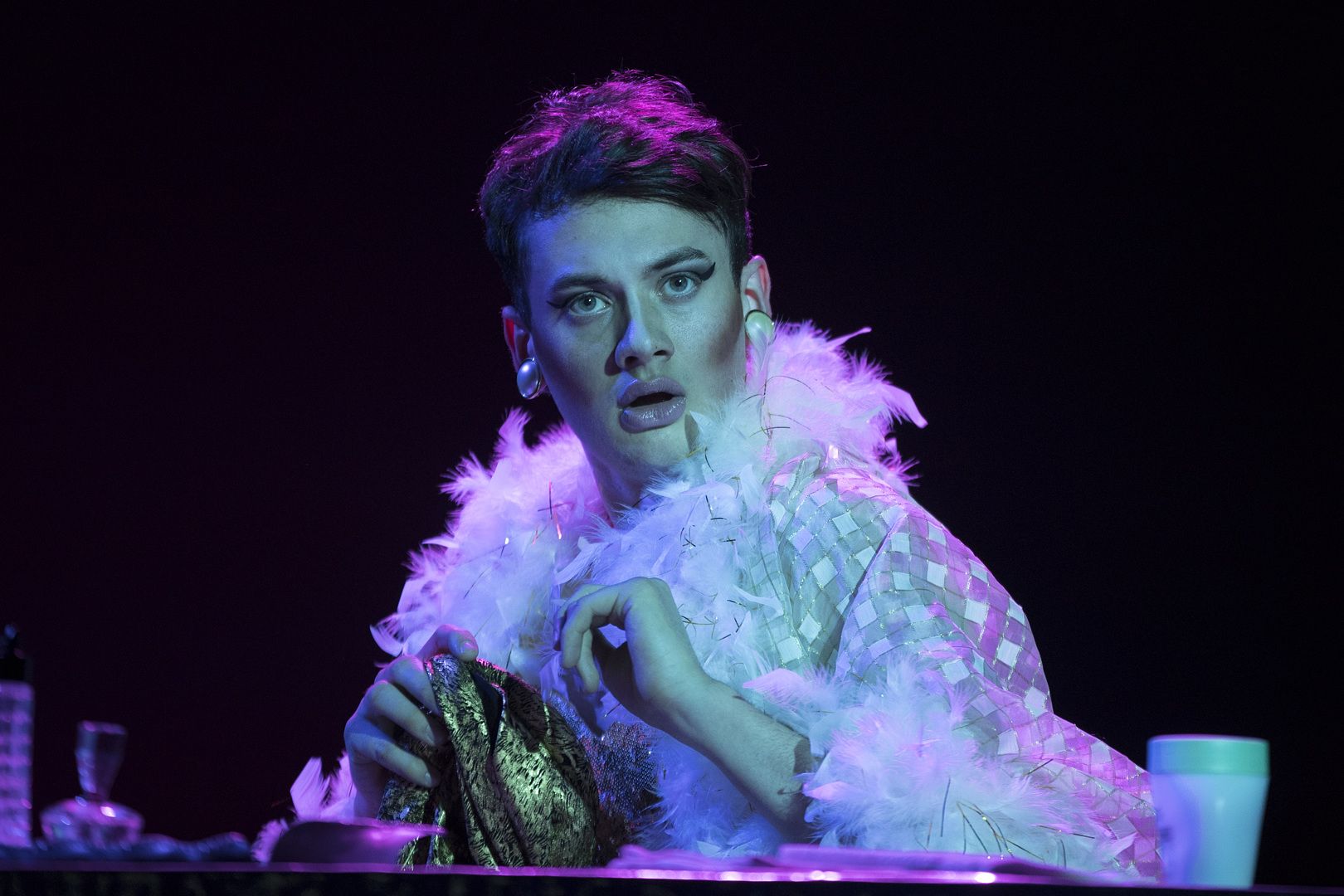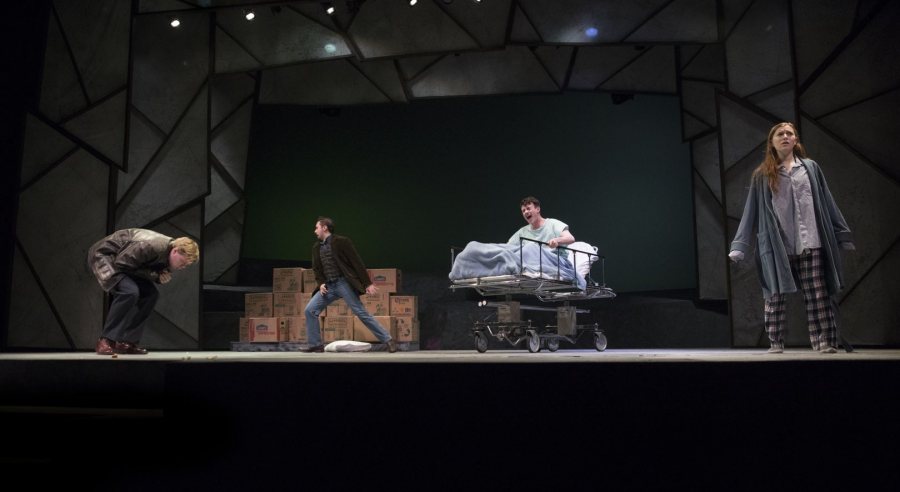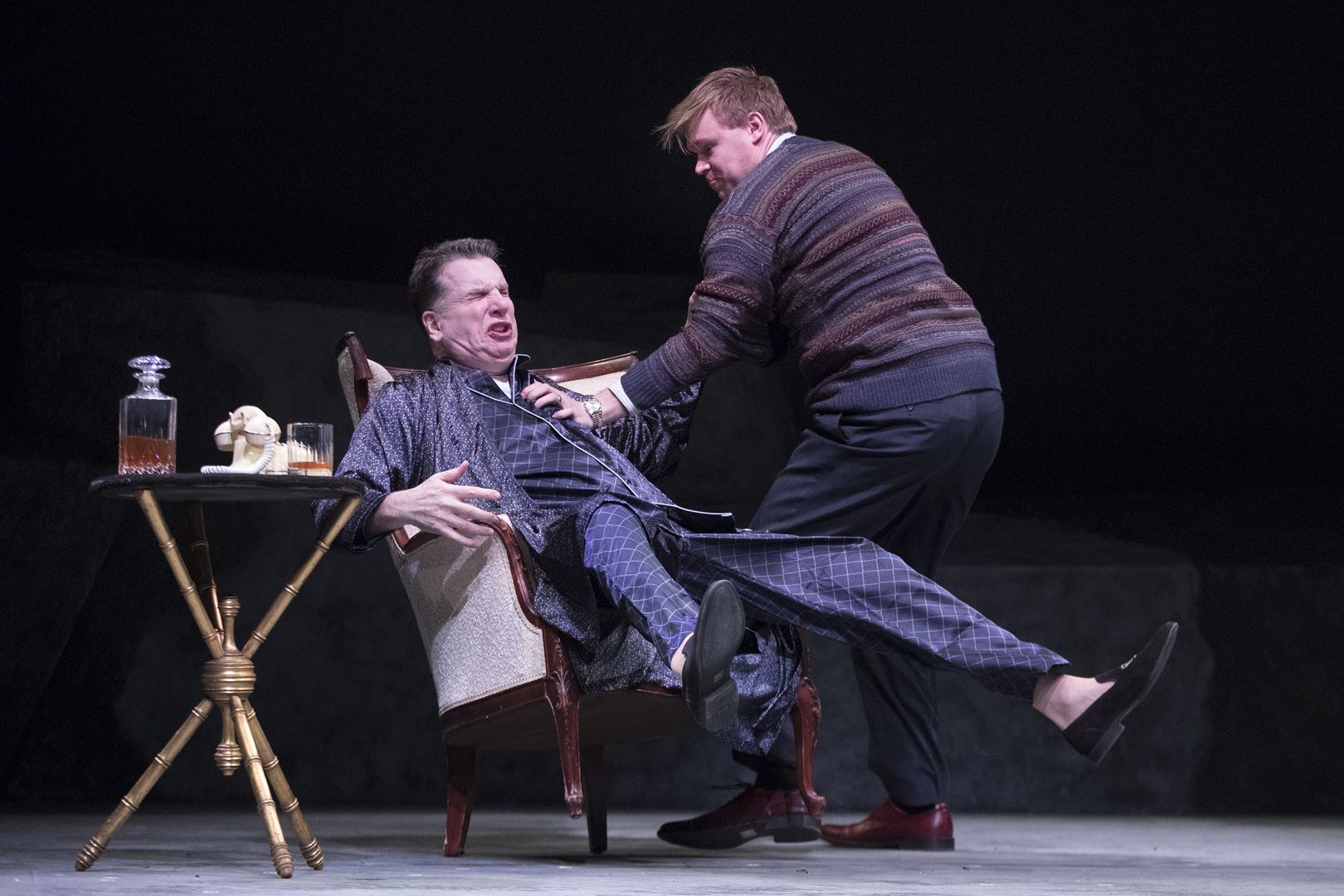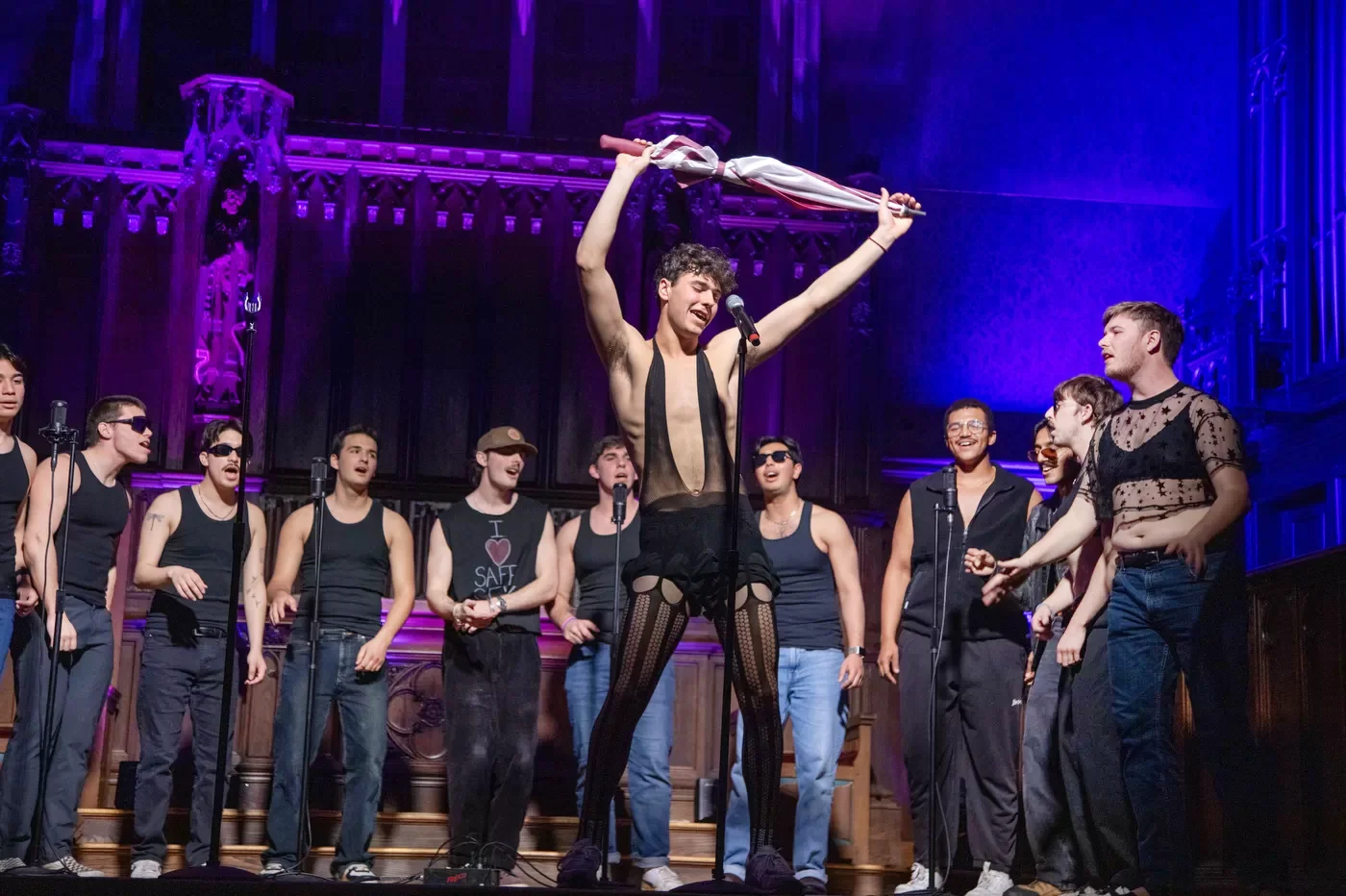
“In our department, there’s great freedom of choice as a director,” says Timothy Dugan, assistant professor of theater. “We’re able to suggest to the department what we would really like to see.”
And what he really wanted to see, Dugan told his theater colleagues last fall — just a few weeks into his first semester here — was Bates presenting one of the pinnacles of 20th-century theater: Angels in America: Millennium Approaches.
The play is the first in playwright Tony Kushner’s duology Angels in America: A Gay Fantasia on National Themes. The plays grapple with love, religion, politics, community — and, especially, with the medical-cultural terror that was the spread of HIV–AIDS in the 1980s. (The second play is AIA: Perestroika.)
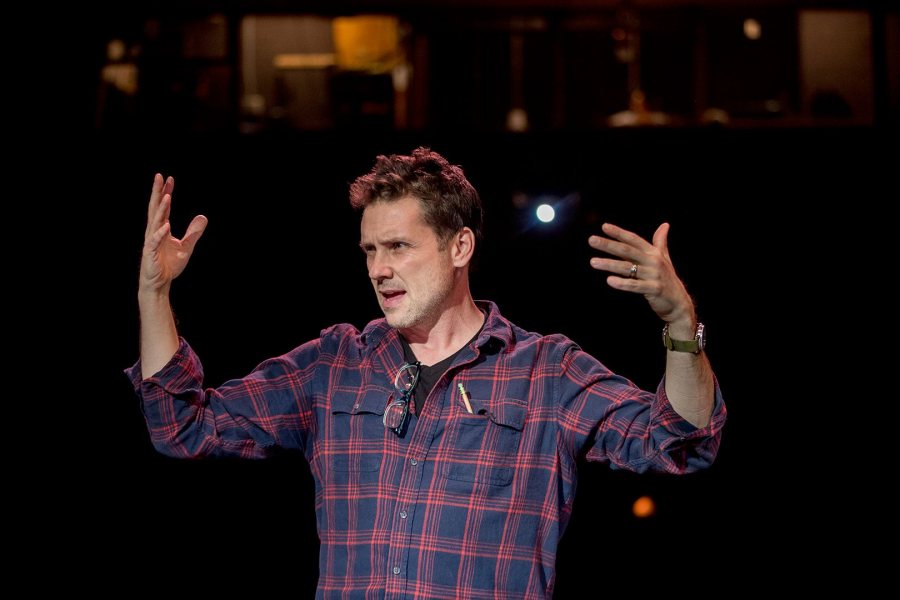
Shown during a March 7 dress rehearsal, Assistant Professor of Theater Tim Dugan is the director of the Bates production of Angels in America: Millennium Approaches. (Phyllis Graber Jensen/Bates College)
The travails of two couples on the rocks drive the plot, wrapped in magical realism and embellished with the savvy fictionalizing of historic figures. But in essence, as the title suggests, the topic of Millennium Approaches is both dead simple and unfathomably complicated: the feeling that everything’s about to change.
The play debuted on Broadway, and received Pulitzer and Tony awards, in 1993 (in which year, the World Health Organization estimated, there were 2.5 million cases of AIDS globally). In 2018, the 25th anniversary of Millennium Approaches’ Broadway debut, it’s appearing in a number of revivals — including the Bates production that, under Dugan’s direction, opened March 8 and continues through the 12th.
A series of supporting events (titled The Great Work Begins, after a key phrase from the play) began in February and included research presentations by scholars and students.
Impressed from the start by the campus’ openness to robust ideas, Dugan says, “I felt like this was something that would be embraced and celebrated. And it has been.”
The play is set in 1985. How is it still relevant?
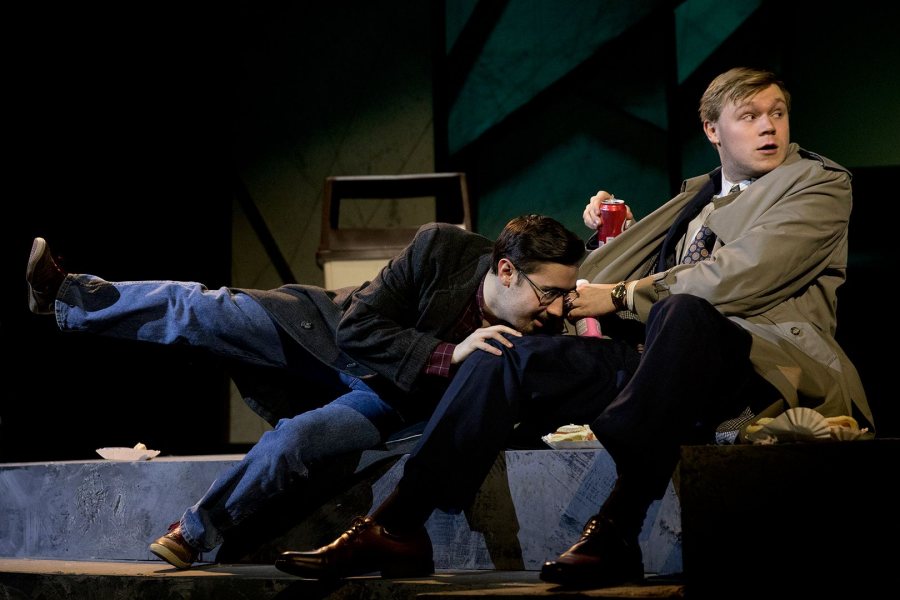
John Dello Russo ’18 plays Louis Ironson and Ethan Winglass ’19 plays Joe Pitt in Angels in America: Millennium Approaches. (Phyllis Graber Jensen/Bates College)
Certainly there has been progress in LGBTQIA+ rights since 1985, when AIDS wasn’t even acknowledged yet as a national epidemic. But, absolutely, this play still resonates today.
One of the characters is Roy Cohn, based on the powerful lawyer. The role isn’t biographical to a T, but we all know that Roy Cohn was President Trump’s lawyer at one point. Certainly you could [view] the playbook that Cohn used to get what he wanted as something that our president has been inspired by and uses to this day. Just a few weeks back, Trump said, “Where’s my Roy Cohn?” in a press conference.
I think Tony Kushner is capturing something a lot of people are wondering about, how we’re questioning democracy in some ways right now. Kushner is an incredible political writer, and he makes no bones about that.
What is Kushner’s overriding theme in Angels in America, do you think?
I think he’s asking us to embrace change. The characters in this play are faced with enormous and often unendurable circumstances. They begin the play in crisis.
We follow Prior Walter, who has been diagnosed with AIDS and then is abandoned by his lover. Prior is the prophet that an angel has come to reckon with. And through him, Kushner gives us this idea that we can resist change — and if so, the consequences will be quite dire — or we can embrace change. Change can be extremely painful and difficult, but in Kushner’s view, it’s necessary.
The play also asks, “What does it mean to be an American?” Because, you know, the play is about so many things — race, spirituality, religion, sexuality. And Kushner uses the AIDS crisis as a lens to ask those questions. What has it taught us about being Americans? How have we been, or not been, there for each other in this situation?
Now more than ever, that question — certainly for myself and certainly for students — has been one we’ve really been digging into and grappling with.
How do you bring your student actors up to speed with the mid-1980s context?
We’re very fortunate to have two student dramaturges on board, Alison Greene ’20 and Luc Alper-Leroux ’20, to do research, and it’s quite extensive with this play. We have a Google folder that the whole cast and crew are invited to, and that’s an enormous aid for all of us, because there are so many historical, religious, and philosophical references in the play.
I have a good friend who works for Actors Theater of Louisville, which produced both parts of Angels last October. Their resident dramaturge did an interview with Alison and Luc — we had a great phone conference — and shared some of her ideas, which illuminated the play for us in an exciting way.
And what’s great about doing it here at Bates is that we’re surrounded by de facto dramaturges. For example, politics professor Stephen Engel [a national authority on American political development and social movements, particularly involving LGBTQ issues] came to a rehearsal of a scene that was talking about different political movements in the ’80s, as Roy and his sidekick Martin Heller are trying to persuade another character to join them. So we were able to unpack it that way. It was wonderful.
How do you drive home to students the sheer emotional and cultural weight of AIDS and HIV in the 1980s?
That’s been one of the most important, and most challenging, parts. I saw the original production in New York — I was working for a theater downtown, and I used to walk through the Village, and there was something in the atmosphere. You could see it passing people on the street.
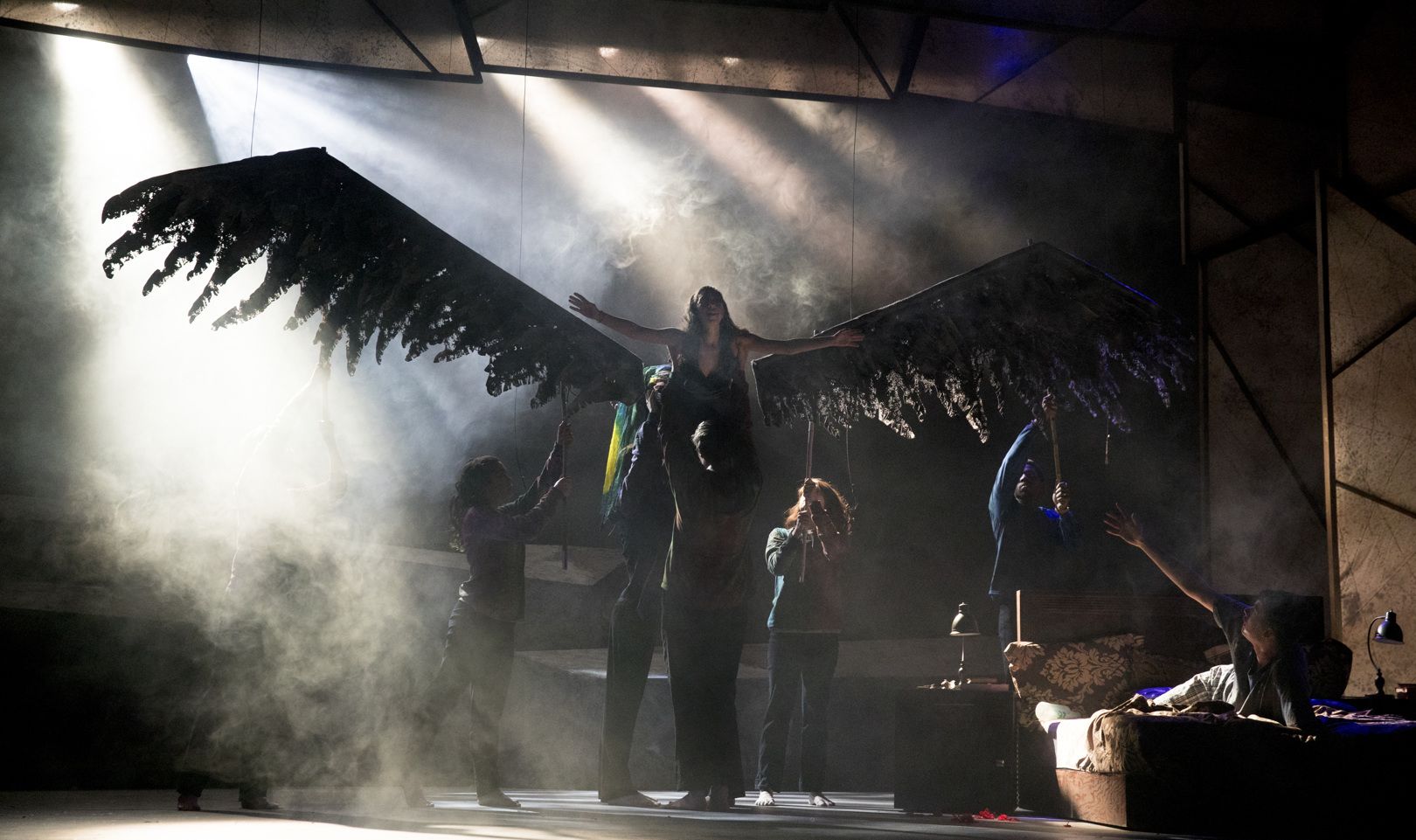
Hello, angel: Prior Walter receives a visitor, played by Sofia Elbadawi ’18. (Phyllis Graber Jensen/Bates College)
To try to capture that for students, we’ve spent a lot of time in dialogue about it, frankly. We’ve immersed ourselves in video clips and other information, and the Great Work Begins series was also designed for all of us to embrace as a cast and crew.
We’re just trying to get to the depth, trying to honor those people who endured that, survived that, died in that.
Timothy Dugan, assistant professor of theater, discusses why a liberal arts college like Bates is the ideal setting for a production of “Angels in America: Millennium Approaches”.
Could you talk a bit more about the department’s support for this project?
I sincerely appreciate their embrace of it because it is a challenging play. Not only for the cast — the play’s three hours long — but technically. Act III is all ghosts appearing and then vanishing, and this great book emerges out of the floor and bursts into flames, and then goes away. You read that in the stage directions, and you have to laugh and say “Come on, Mr. Kushner” — because he also says, “All in 30 seconds.”
And, oh, yeah — there’s an angel that cracks through the ceiling of Prior’s apartment, descends, and has the last final moment. How do you pull that off? There are so many creative problems to solve, and the department has been totally game.
The actress playing Harper Pitt, Hope French ’18, has undertaken the part for an honors thesis, which will include a written component as well as the performances. Tell us a bit about how she prepared for the role.
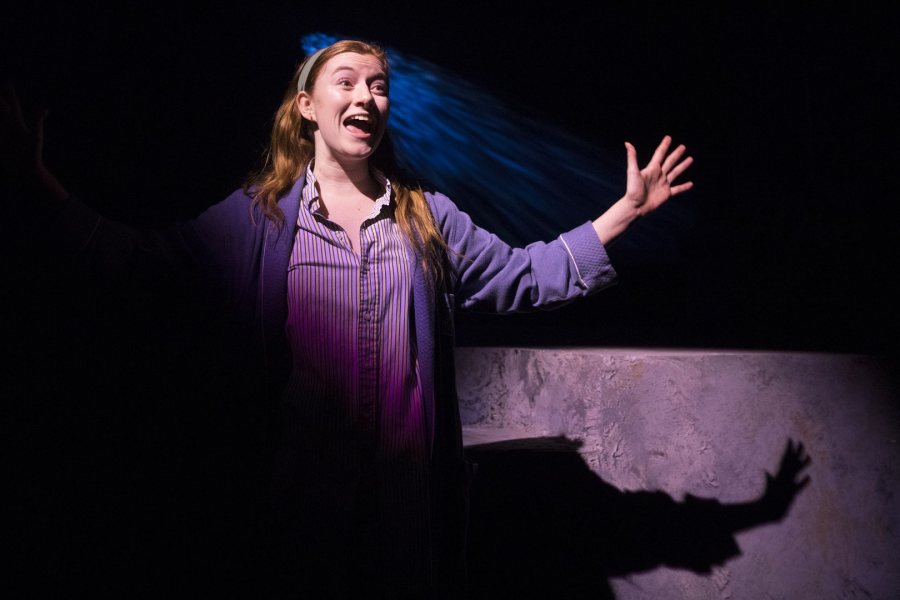
Hope French ’18 portrays Harper Pitt as part of her honors thesis in theater. (Phyllis Graber Jensen/Bates College)
Harper is the wildly imaginative, Valium-popping, hallucination-prone, and terribly lonely wife of Joe Harper. Their marriage is falling apart throughout the play as they confront both Joe’s sexuality — he’s coming out — and their love for one another.
Hope passionately immersed herself in these complex, hugely emotional realms of the role and the world of the play, and did extensive research, both into the socio-historical context and her own portrayal. She’s been incredibly enthusiastic and receptive toward exploring different approaches to creating a character. We spent last semester delving into the Michael Chekhov Technique, a psycho-physical approach to acting that emphasizes the use of imagination as a way in for an actress, and she experimented with applying that to this role, which is really one of the emotional centers of Angels in America.
Hope brings a professionalism to her work that is beyond her years, which is inspiring to witness.
And your casting choice for Cohn may surprise many Batesies: Kirk Read, professor of French and francophone studies.
I knew from the beginning that I’d love to have someone older than a student in the Roy Cohn role. I got to know Kirk during new faculty orientation and we hit it off immediately. When I was thinking about this, I said, “All right, what the hell?”
So I kind of bothered him for a while, and then he graciously accepted. And he said from the beginning, “Treat me like anyone else.” His commitment is amazing.
